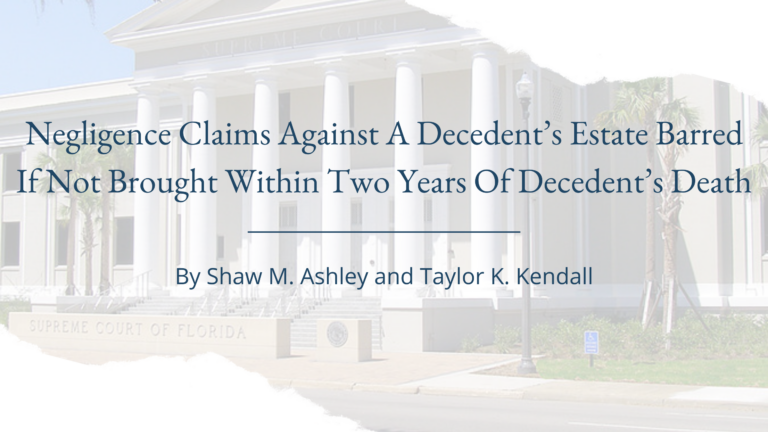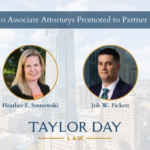On June 29, 2023, the Florida Supreme Court ruled in favor of an insured’s estate and former employer that claims for negligence must be dismissed as they were not brought within two years pursuant to Florida Probate Statutes. In Samantha Elain Tsuji, et al., v. H. Bart Fleet, etc. et al., No. SC2021-1255 (Fla. 2023), the Florida Supreme Court ruled Florida Statute §733.710(1), claims for negligence against a descendant’s estate, are limited by a two-year statute of limitations. Additionally, when a statute of repose bars claims against an agent for negligence, the principle (in this case, a vicarious liability company) is released from any liability resulting solely from the agent’s negligence.
Tsuji involved a motor vehicle accident that occurred on June 11, 2014, where Thomas E. Morton Jr. injured petitioners, Samantha Tsuji, and Crystal Williams. At the time of the accident, Morton was working for Lewis Bear Company (LBC) and was driving a company owned automobile within the scope of his employment. Three years later, on February 6th, 2018, the Petitioners decided to seek redress and sued Morton for negligently operating the car and LBC for vicarious liability under the doctrines of respondent superior and dangerous instrumentality. Petitioners learned Morton died from unrelated causes only weeks after the accident on June 28, 2014. Petitioners substituted a personal representative for Morton and reduced their request for damages against the estate to the limits on Morton’s casualty insurance coverage.
The court ruled the Petitioners’ claim against the Estate was barred pursuant to §733.710(1) because they failed to file their claim within two years of Morton’s death. Since the Estate could not be held liable, LBC, as the alleged vicariously liable employer, was also released from liability. The court addressed the interpretation of §733.710 and examined two sets of limits in the Florid Probate Code (§733.702 and §733.710) that regulate creditor claims against an estate.
The Court found pursuant to §733.710(1), untimely claims are automatically barred unless specific exceptions apply, such as fraud, estoppel, or insufficient notice of claims. The exceptions did not apply in this case. The Petitioner argued that they sought damages only from Morton’s casualty insurance coverage, relying on §733.702(4)(b). However, the court concluded that casualty insurance was not addressed in the exceptions of §733.710(1) and therefore, the claim was barred.
As to LBC, the court agreed with Florida’s First District Court of Appeal ruling that when a statute of repose bars claims against an agent (Morton) for negligence, the principal (LBC) is exonerated from vicarious liability solely based on the agent’s negligence. Since the employee’s liability could not be established in a vicarious liability action against the employer, LBC was released from vicarious liability.
Link to the Court’s opinion: https://bit.ly/3rcOMOV


